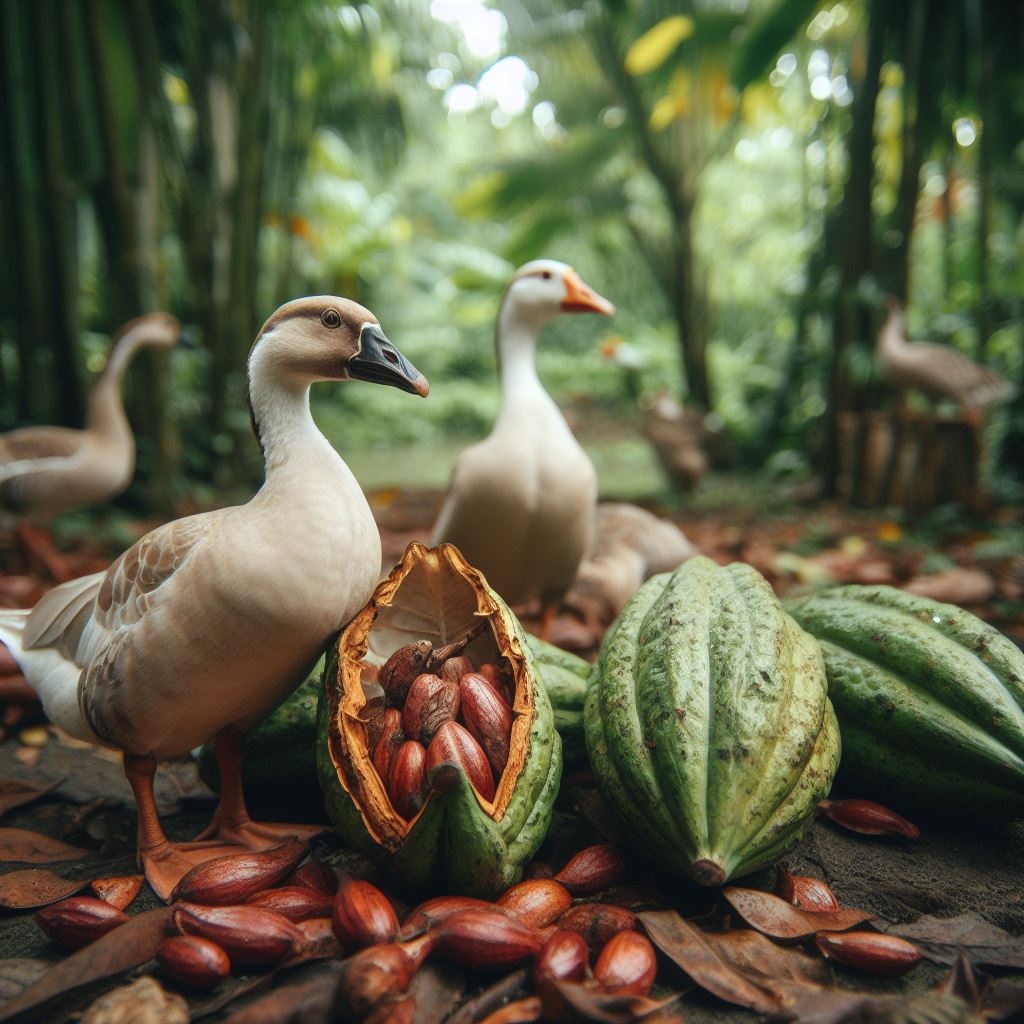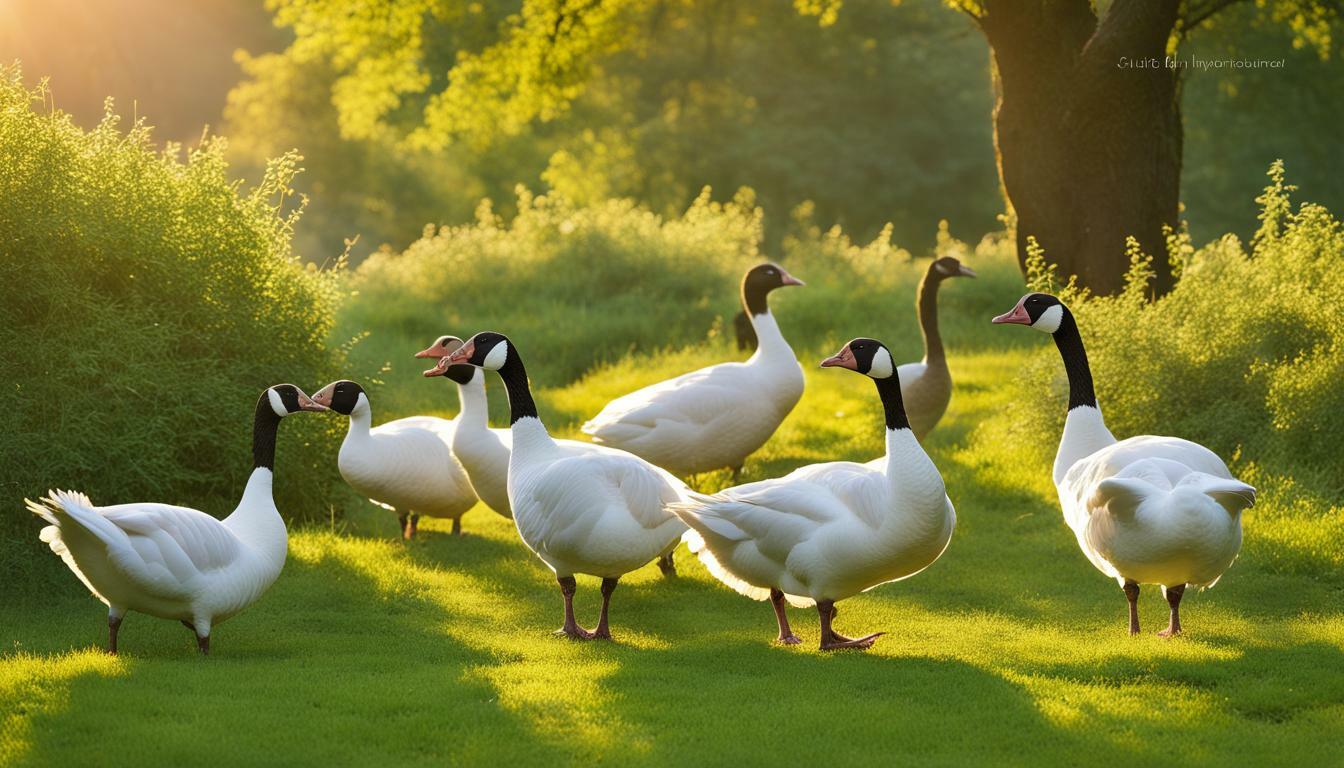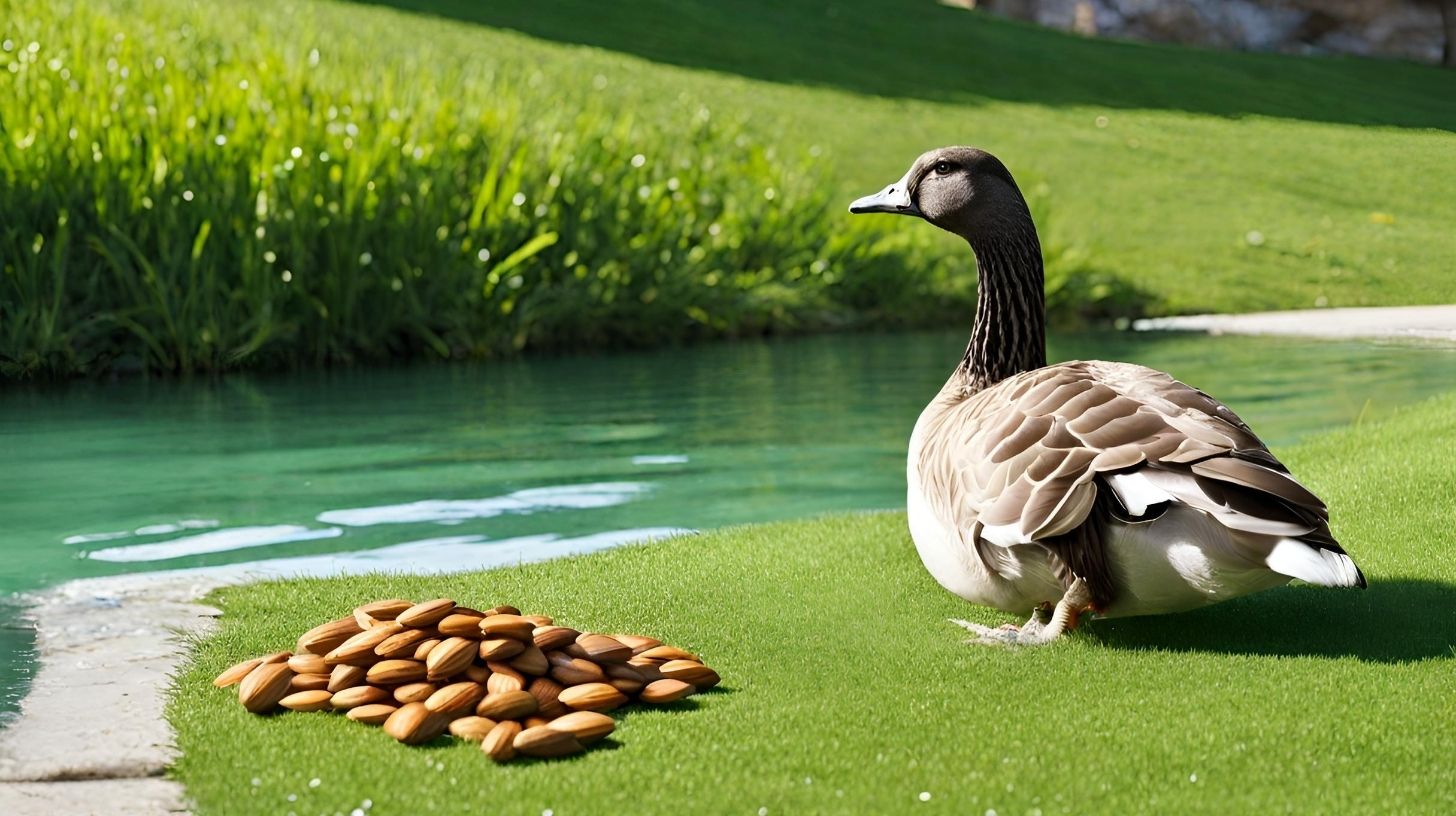Can Geese Eat Oranges? A Healthy Diet for Geese

Table of content:
If you’re a proud owner of geese or simply enjoy watching them in your local pond, you may be wondering if it’s safe and healthy to feed them oranges. Geese are known for their love of all things edible, but not all human foods are safe for them to consume. In this article, we’ll explore the topic of can geese eat oranges and provide you with all the information you need to know.
Geese, like any other living creature, require a well-balanced diet in order to maintain their overall health. Providing them with a diet that is both nutritious and diverse can help ensure their longevity and well-being.
Key Takeaways:
- Geese require a well-balanced diet
- Not all human foods are safe for geese consumption
- This article explores whether geese can eat oranges safely and provides guidelines for feeding oranges and maintaining a healthy diet for geese
The Nutritional Value of Oranges for Geese
If you’re wondering whether geese can eat oranges, the answer is yes, they can! In fact, oranges are a healthy addition to a goose’s diet, as they offer a range of essential vitamins and minerals that are beneficial for their health.
Oranges are an excellent source of vitamin C, which is essential for immune system function and can help prevent illness and disease. They also contain vitamin A, which supports healthy vision, and potassium, which is important for heart function and muscle contractions.
In addition to vitamins and minerals, oranges are also a good source of fiber, which can aid in digestion and keep geese feeling full and satisfied. As with any food, however, moderation is key when it comes to feeding oranges to geese.
The Nutritional Content of Oranges
One medium-sized orange contains approximately:
- 70 milligrams of vitamin C
- 400 IU of vitamin A
- 250 milligrams of potassium
- 3.1 grams of fiber
It is important to note that while oranges are a healthy addition to a goose’s diet, they should not be the only food provided. A well-rounded diet includes a variety of nutrients from different food sources.
Can Geese Consume Citrus Fruits?
If you’re wondering whether geese can eat citrus fruits besides oranges, the answer is not straightforward. While oranges are considered safe for geese in moderation, consuming too many citrus fruits can be harmful to them.
The high acidity in citrus fruits can cause digestive issues for geese, leading to diarrhea or vomiting. In addition, feeding geese a diet that is too high in citrus fruits can disrupt the balance of their gut microbiome.
What citrus fruits can geese eat?
Geese can consume a limited amount of citrus fruits such as lemons, limes, and grapefruits. However, it is important to note that these fruits should only be offered sparingly and in small portions.
What are the risks of feeding geese citrus fruits?
Feeding geese too many citrus fruits can lead to health issues, including digestive upset and a decrease in appetite. Additionally, some geese may develop an allergic reaction to these fruits, so it’s important to monitor their behavior after introducing any new foods to their diet.
If you choose to feed your geese citrus fruits, ensure that they make up only a small part of their overall diet and are offered in moderation. Consult with a veterinarian if you have any concerns about whether a specific citrus fruit is safe for your geese to consume.
Guidelines for Feeding Oranges to Geese
Feeding oranges to your geese can be a healthy and enjoyable treat for them, but it’s important to do so in moderation and with caution. Here are some guidelines to follow when feeding oranges to your geese:
- Introduce oranges gradually and in small portions to avoid any digestive issues.
- Feed oranges only as a supplement to their regular diet. Oranges should not make up the majority of their food intake.
- Offer oranges only when they are ripe and fresh. Avoid feeding them spoiled or moldy oranges.
- Remove the peel and any seeds before feeding oranges to your geese. The seeds can be a choking hazard, and the peel can be difficult for them to digest.
- Monitor your geese after feeding them oranges for any adverse reactions or digestive issues, such as diarrhea or vomiting.
- Limit the amount of oranges you feed your geese to a few pieces per week. Overfeeding them oranges can lead to an unbalanced diet and potential health problems.
By following these guidelines, you can safely and effectively incorporate oranges into your geese’s diet for a healthy and enjoyable treat.
Maintaining a Healthy Diet for Geese
While oranges can be a healthy addition to a goose’s diet, it’s important to remember that they should not be the only food in their daily intake. Geese require a well-balanced diet to ensure they receive all the necessary nutrients for optimal health.
When planning your goose’s diet, it’s important to consider their age, gender, and activity level. For example, growing goslings require more protein than adult geese, while female geese need additional calcium to support egg-laying.
In addition to oranges, consider incorporating other foods that are beneficial for geese. High-quality poultry feed is a convenient option that provides a balance of nutrients. You can also supplement their diet with leafy greens, such as kale or spinach, and grains like wheat and barley.
Feeding Guidelines
If you choose to feed oranges to your geese, it’s important to do so in moderation. Too many oranges can cause digestive issues and lead to obesity. Your goose’s overall daily intake of oranges should not exceed 10% of their total diet.
When feeding oranges, it’s important to cut them into small pieces to prevent choking and to remove any seeds. Make sure your goose always has access to clean water to aid in digestion.
Variety is Key
Just like humans, geese enjoy a variety of foods, and a diverse diet can help prevent boredom and ensure they receive all the necessary nutrients. Consider rotating different foods and treats to keep your geese healthy and happy.
Other Considerations for Geese Nutrition
When it comes to maintaining a healthy diet for geese, it’s important to consider factors beyond just their food intake. Seasonal variations can affect their dietary needs, such as increased protein requirements in the breeding season. Additionally, the environment in which the geese are fed can impact their nutrition. For example, geese that have access to pasture with a variety of grasses and plants may have a more diversified and nutrient-rich diet than those kept solely on a grain-based diet.
Supplementation
In some cases, it may be necessary to supplement a goose’s diet with additional nutrients to ensure they are meeting their daily requirements. Vitamin and mineral supplements can be added to their feed or water, but it’s important to consult with a veterinarian or avian nutritionist to determine appropriate dosages.
Water Intake
Water is also an essential component of a goose’s diet. They require access to clean, fresh water at all times, even in cold weather when natural water sources may be frozen. Inadequate water intake can lead to health issues such as dehydration, poor egg production, and increased susceptibility to diseases.
Monitoring
Regular monitoring of a goose’s body condition can also help ensure they are receiving adequate nutrition. Overfeeding can lead to obesity and health issues, while underfeeding can lead to malnutrition and developmental problems. It’s important to regularly assess their body weight and adjust their diet accordingly.
Consulting a Professional
If you have any concerns about your geese’s diet or nutritional needs, it’s always best to consult with a veterinarian or avian nutritionist. They can provide personalized recommendations based on your specific situation and help ensure the health and well-being of your feathered friends.
Risks and Precautions with Feeding Oranges to Geese
While oranges can offer numerous nutritional benefits to geese when fed in moderation, there are certain risks and precautions to keep in mind.
Allergies
Some geese may have allergies or sensitivities to citrus fruits, including oranges. If you notice any signs of an allergic reaction, such as difficulty breathing or swelling, discontinue feeding oranges immediately and consult a veterinarian.
Digestive issues
Geese have delicate digestive systems, and consuming too many oranges or other citrus fruits can cause digestive issues such as diarrhea or upset stomachs. It’s important to introduce oranges gradually into their diet and monitor their digestion closely. If you notice any abnormal digestive symptoms, reduce the amount of oranges you’re feeding or discontinue feeding them altogether.
Vitamin C overdose
While vitamin C is a beneficial nutrient for geese, too much of it can be harmful. Oranges are rich in vitamin C, and feeding excessive amounts may lead to vitamin C overdose. Symptoms of vitamin C overdose may include lethargy, diarrhea, and gastrointestinal issues. Stick to moderate portions of oranges and monitor your geese carefully.
With these risks in mind, it’s important to ensure that oranges and other citrus fruits are fed as a part of a balanced diet and in moderation. By keeping a close eye on your geese and practicing responsible feeding habits, you can keep them healthy and happy.
Conclusion
After exploring the question, “Can geese eat oranges?” it is clear that oranges can be a nutritious addition to a goose’s diet. However, it is important to remember that a balanced diet is essential for their overall health and well-being.
If you choose to feed oranges to your geese, be sure to follow the guidelines outlined in this article and monitor their reaction. As with introducing any new food, it is always best to start with small amounts and gradually increase as you observe their response.
Remember to consider other factors that may impact their nutrition, such as season and environment, and always proceed with caution when introducing new foods to their diet. With proper care and attention, geese can thrive on a healthy and diverse diet.
Welcome. I’m Adreena Shanum, the proud owner of this website, and I am incredibly passionate about animals, especially poultry. I founded adreenapets.com as a labor of love, stemming from my desire to share my knowledge and experiences with poultry enthusiasts worldwide.




